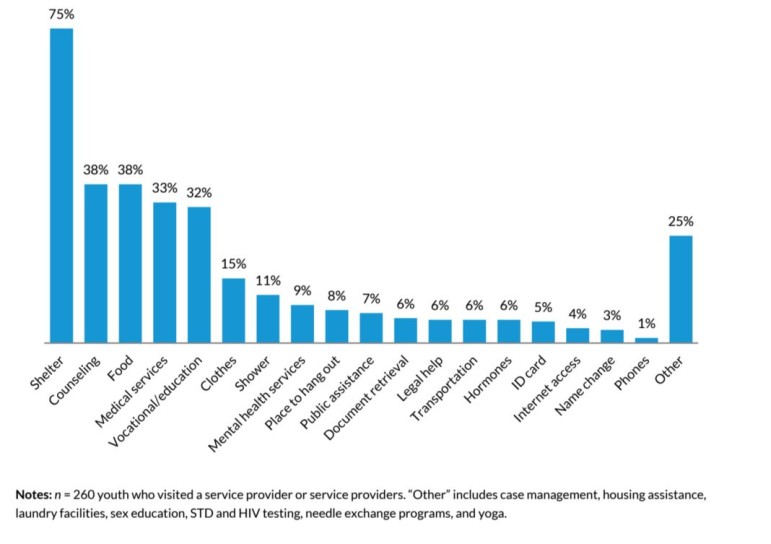
Most LGBTQ youth who trade sex for necessities or money they need to survive use protection to prevent sexually transmitted infections and pregnancy — but not everyone does, and not every time, says a new report from the Urban Institute.
More than 60 percent of youth surveyed for the report always used protection, most commonly condoms.
But some youth reported that they will forgo condoms if they feel safe with a partner or a friend, are forced not to use them or can make more money without protection.
One teenager said he wants to use condoms but doesn’t feel like it’s always an option.
“But sometimes I still got to do it. I need the money, and some dudes throw in extra money for it, so I go with it, and just about a month literally, I think a month ago I found out that I was HIV positive, yeah so,” said the 19-year-old.
The youth’s desperation for income points to the need for employment, but job training programs are not always easy to come by, said Meredith Dank, the lead author of “Access to Safety.”
“There isn’t an easy way to address it, especially when they are hungry, homeless and desperate, and a little money means a hotel room for the night or food,” she said.
The scenario is one that illustrates the report’s central themes: Gaps in services undercut young people’s efforts to find stability in ways that can be harmful.
The report looks at the health of LGBTQ youth who engage in survival sex, as well as their experiences finding services such as shelter, health care and job training.
Nearly all the youth surveyed visited at least one service provider, but 64 percent said they still had unmet needs. In particular, young people said they wanted better access to vocational or education assistance, longer-term housing assistance and counseling.
The findings are based on in-depth interviews with 283 young people, ages 15 to 26, who identify as LGBTQ, young men who have sex with men or young women who have sex with women.
Earlier reports from the Urban Institute based on the research examined why LGBTQ young people are engaging in survival sex and their interactions with law enforcement.
This research project has helped illuminate the experiences of youth that providers long have known existed but did not have data to back up, said Lillian Rivera, director of advocacy and capacity building at the Hetrick-Martin Institute, a New York-based organization that provides direct services and referrals for LGBTQ youth.
Rivera said the findings highlight the fact that LGBTQ youth typically end up engaged in survival sex because traditional services fail them, not because they are coerced by another person — pointing to the need to improve services at all points on the continuum.
“They’re not trafficked by someone. They’re trafficked by a lack of systemic support,” Rivera said.
Health status
The report’s findings on health status include:
- Nearly 30 percent of young people surveyed reported having a previous or current sexually transmitted infection. Among that group, chlamydia was the most common, at 60 percent, followed by gonorrhea (36 percent) and HIV/AIDS (21 percent).
- Nearly 90 percent of those surveyed also reported current or past substance use, most commonly alcohol, tobacco or marijuana. These findings “challenge the misconception that these young people are commonly addicted to ‘hard’ drugs, such as crack, heroin, and meth,” according to the report.
- Sixty-four percent of youth reported health problems other than those transmitted sexually, primarily mental health disorders such as bipolar disorder, depression and anxiety. Only 7 percent of youth reported being diagnosed with post-traumatic stress disorder (PTSD).
Dank said the findings on PTSD could be one area for further study, since the number struck researchers as low.
“Based on a lot of their experiences and what they were describing, you could draw some natural conclusions that there was PTSD there,” she said.
The report recommends more training for both mental health professionals and staff at youth provider organizations on how to recognize PTSD and direct young people to appropriate care.
Almost all the youth surveyed reported they had seen a doctor during the past year. Some said they trusted their doctors a great deal and consulted with them about their lives, including sharing that they were engaged in survival sex.
The report included recommendations to bolster services for LGBTQ youth engaged in survival sex, including: using mobile health clinics to meet young people where they are, raising awareness of pre-exposure prophylaxis medication that can reduce HIV transmission and supporting mental health counseling that provides continuity for youth and minimizes burnout for therapists and case workers.
Young people offered their own recommendations as well, including: more housing options, including for youth up to age 24; financial literacy training; job training and mentorship programs.
































